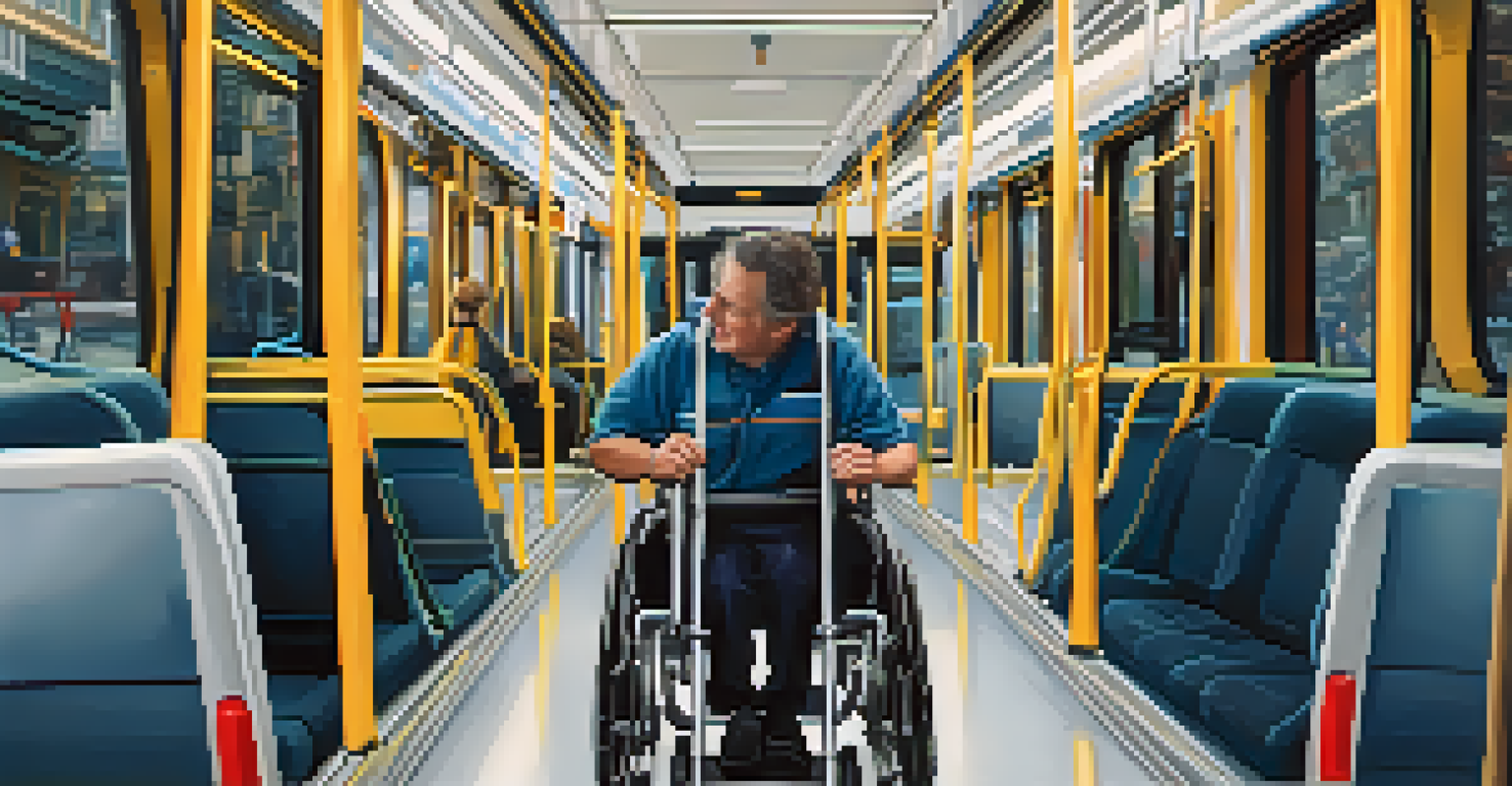Legal Rights for Individuals with Disabilities in California

Overview of Disability Rights in California
California has a rich history of advocating for the rights of individuals with disabilities, ensuring they have access to resources and protections. This commitment is reflected in various laws and regulations aimed at promoting equal opportunities in all aspects of life. Understanding these rights is crucial for individuals and their families to navigate the system effectively.
Disability is not a badge of shame, but a symbol of courage.
The foundation of these rights is built on federal legislation, such as the Americans with Disabilities Act (ADA), which prohibits discrimination based on disability. However, California has its own set of laws that further enhance these protections, including the California Fair Employment and Housing Act (FEHA). Together, these laws create a robust framework for safeguarding the rights of individuals with disabilities.
It's essential for individuals to familiarize themselves with these rights, as they cover various areas including employment, housing, education, and public services. By understanding their rights, individuals can advocate for themselves and ensure they receive the support they need to thrive.
Employment Rights for Individuals with Disabilities
One of the most significant areas of focus for individuals with disabilities is employment. Under the ADA and FEHA, individuals are protected from discrimination in hiring, promotion, and job assignments. Employers are required to provide reasonable accommodations to enable employees to perform their duties effectively.

Reasonable accommodations can include modifications to work schedules, adjustments to workstations, or specialized equipment. It's important for employees to communicate their needs to employers openly, as this can lead to a more inclusive work environment. Additionally, employees have the right to request accommodations without fear of retaliation.
Understanding Disability Rights
Familiarizing oneself with disability rights in California is essential for individuals and families to effectively navigate systems and advocate for necessary support.
California also provides resources through organizations that assist individuals with disabilities in finding and maintaining employment. These organizations can offer job training programs, counseling, and support services to ensure that individuals are equipped to succeed in the workforce.
Housing Rights for Individuals with Disabilities
Housing is another critical area where individuals with disabilities have specific legal protections. The Fair Housing Act prohibits discrimination in housing based on disability, requiring landlords to make reasonable accommodations for tenants. This includes allowing service animals or making modifications to the living space to meet accessibility needs.
The greatest disability is not the physical one, but the inability to see the potential in others.
Individuals facing discrimination in housing can file complaints with the California Department of Fair Employment and Housing (DFEH). The DFEH investigates claims and can take legal action against landlords who violate these rights. It's vital for individuals to know that they have avenues for recourse if they encounter discriminatory practices.
Moreover, California's housing programs often cater to individuals with disabilities, providing resources for affordable housing options. By understanding their rights, individuals can advocate for themselves and seek out housing that meets their needs.
Education Rights for Individuals with Disabilities
In California, students with disabilities are entitled to a free and appropriate public education (FAPE) under the Individuals with Disabilities Education Act (IDEA). This law mandates that schools provide necessary services and accommodations to support the educational needs of students with disabilities. Understanding these rights is crucial for parents and guardians advocating for their children's education.
Schools are required to develop an Individualized Education Program (IEP) tailored to each student's unique needs. This program outlines specific goals, accommodations, and services that the student will receive. Parents have the right to participate in the development and review of their child's IEP, ensuring that their concerns are heard and addressed.
Employment and Housing Protections
California laws, including the ADA and FEHA, provide critical protections against discrimination in employment and housing for individuals with disabilities.
Additionally, California provides resources for parents and students to help navigate the education system. By being proactive and informed, families can ensure that students with disabilities receive the support needed to succeed academically.
Transportation Rights for Individuals with Disabilities
Transportation accessibility is a key component of independence for individuals with disabilities. In California, the Americans with Disabilities Act requires public transportation systems to be accessible to all users. This includes providing accessible vehicles, station facilities, and service options for individuals with mobility challenges.
Additionally, local transit agencies are obligated to offer paratransit services, which provide door-to-door transportation for individuals who cannot use regular bus or train services due to their disabilities. Understanding the availability of these services can greatly enhance the mobility and independence of individuals with disabilities.
Individuals should also know their rights when using transportation services, including the right to request accommodations and report any issues they encounter. Being informed about these rights empowers individuals to advocate for their transportation needs effectively.
Healthcare Rights for Individuals with Disabilities
Access to healthcare is a fundamental right for individuals with disabilities, and California has laws in place to protect this access. Under the Affordable Care Act (ACA), insurers cannot deny coverage based on pre-existing conditions, including disabilities. This ensures that individuals receive the medical care they need without facing barriers due to their disabilities.
California also offers various programs specifically designed to assist individuals with disabilities in accessing healthcare services. These programs may include Medi-Cal, which provides low-cost or no-cost health coverage to eligible individuals. It's essential for individuals to explore these options to ensure they have the necessary healthcare support.
Access to Resources and Services
Numerous organizations and programs in California are available to assist individuals with disabilities in accessing education, employment, and healthcare services.
Moreover, individuals have the right to receive reasonable accommodations in healthcare settings. This may involve providing accessible facilities, communication assistance, or modifications to treatment plans. Knowing these rights helps individuals advocate for their health and well-being effectively.
Legal Protections Against Discrimination
Individuals with disabilities are afforded legal protections against discrimination in various areas, including employment, housing, and public services. California's laws reinforce the protections established by federal legislation, providing a comprehensive framework for individuals to seek justice if they feel their rights have been violated. Understanding these protections is crucial for individuals to advocate for themselves.
The process of filing a discrimination complaint can vary depending on the issue at hand. Generally, individuals can file complaints with agencies like the DFEH or the Equal Employment Opportunity Commission (EEOC) in employment-related cases. Knowing the appropriate steps to take can empower individuals to seek redress effectively.

Additionally, individuals may seek legal representation to navigate the complexities of discrimination cases. Organizations specializing in disability rights can provide resources and support for individuals pursuing legal action. By being aware of their legal protections, individuals can stand up against discrimination confidently.
Resources for Individuals with Disabilities in California
Navigating the landscape of rights and resources can feel overwhelming, but there are numerous organizations and agencies dedicated to supporting individuals with disabilities in California. From advocacy groups to legal aid organizations, these resources provide essential guidance and assistance. It's important for individuals to familiarize themselves with these resources to access the support they need.
Many local and state organizations offer programs focused on education, employment, and community integration. These programs can help individuals connect with peers, find job opportunities, and access services tailored to their needs. Engaging with these organizations can foster a sense of community and empowerment.
Furthermore, online resources and hotlines are available for individuals seeking information about their rights. These platforms can provide valuable insights and direct individuals to the appropriate services. By utilizing these resources, individuals can advocate for their rights and enhance their quality of life.